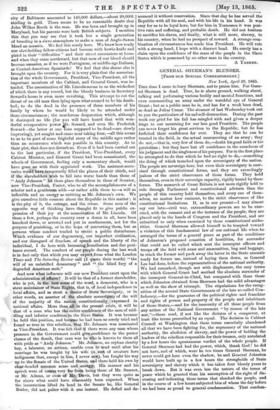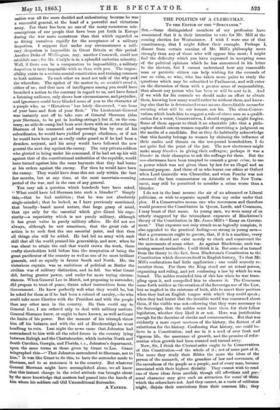GENERAL SHERMAN'S BLUNDER.
[FROM OUR SPECIAL CORRESPONDENT.] the doing of which trenched upon the sovereignty of the nation. The people are sovereign here, but even their sovereignty is exer-
cised through constitutional forms, and they are exceedingly jealous of the strict observance of those forms. They hold themselves, even in their sovereign capacity, rigidly bound by those forms. The monarch of Great Britain is not more rigidly held to rule through Parliament and constitutional advisers than the people of this country hold themselves, and every one of them- selves, no matter how eminent, to the strict observance of like constitutional limitations. If, as in our present—I may almost say our late—civil war, extraordinary powers are to be exer- cised, with the consent and at the instance of the people, they are placed only in the hands of Congress and the President, and are submitted to only when exercised by these constitutional autho- rities. General Sherman allowed himself to be tempted toward a violation of this fundamental law of our national life when he arranged the terms of a general peace as part of the conditions of Johnston's proposed cessation of hostilities, for surrender that could not be called which sent the insurgent officers and troops off the field with arms and ammunition, bag and baggage, to stack the former and pack away the latter in the State arsenals ready for future use, instead of laying them down, as General Lee had done, before the representatives of the national authority. We had remarked, though not with displeasure, the easy terms with which General Grant had soothed the absolute surrender of the insurgent General-in-Chief, but compared with these those which Johnston obtained from Sherman had the solid advantages as well as the show of triumph. The stipulations for the recog- nition of the several State Governments of the late so-called Con- federacy,—for the guarantee of the political rights and franchise and rights of person and property of the people and inhabitants- of those States,—and for the immunity of all those people from any action of the National Government "by reason of the late war,"--these read, if not like the dictates of a conqueror, at least like terms prescribed by an equal. The decision in Cabinet Council at Washington that these terms essentially abandoned all that we have been fighting for, the supremacy of the national authority, the abolition of slavery, and the power of holding the leaders of the rebellion responsible for their treason, only antedated by a few hours the spontaneous verdict of the whole people. If General Sherman had had the power, which, thank God! he did not have, and of which, were he ten times General Sherman, he never could get here even the shadow, he and General Johnston would have built up in a few hours the strongholds of State sovereignty and slavery which it has taken four bloody years to break down. But it was even less the nature of the terms of peace which he granted than his assumption of the right of dis- cussing and indicating those terms that shocked the people, and in the course of a few hours subjected him of whom the day before we had been Bo proud to general condemnation. That condem-
nation was eli the more decided and unhesitating because he was a successful general, at the head of a powerful and victorious army. For there has been no one of the many monstrous mis- than that which regarded us any circumstances a m despotism. I suppose that under ili- Well, if there can be a comparative to impossibility, a military despotism is more impossible with us than with you. The impos- sibility exists in a certain mental constitution and training common man or patriotic citizen can help wishing for the counsels of
to both nations. To each other we need not talk of the why and one so calm, so wise, who has taken more the wherefore. The upshot of the matter is, we wouldn't stand it, questions which may be submitted to Parliament, and will enter
either of us ; and that men of intelligence among you could have broached a notion to the contrary in regard to us, and have found than almost any person who has a listening audience, only shows how circumstances, and prejudice, if and ignorance could have blinded some of you to the character of a people who, as " Historicus " has lately discovered, "are bone was your bone and flesh of your flesh." The Lieutenant-General was instantly sent off to take care of General Sherman (alas poor Sherman, to be put in leading-strings I) but if, on the con- trary, an aide-de-camp had been sent down with an order relieving Sherman of his command and superseding him by one of his suboidinates, he would have yielded prompt obedience, or if not he would have been put as easily under guard as if he had been a ul their smiles and threats on the ten-pound householders, I do drunken serjeant, and his army would have followed the new general the next day against the enemy. The very private soldiers te
make many blunders in giving their suffrages ; perhaps it was a who gloried in being under his command, if he had set up his will blunder in their champion to ask the suffrage for them. But the against that of the constitutional authorities of the republic, would non-electresses have been tempted to commit a great crime, to use have turned against him the same bayonets that they had borne a power which was not given them by law for an illegal and an at his orders against the enemy. For then he would have been immoral purpose. And those of us who learnt our ethics at Oxford the enemy. They would have done this not only within the last when Lord Grenville was Chancellor, and when Fouclui was not few months, but at any time, at the most uncertain-seeming esteemed the best commentator on Aristotle or the New Testa- period of the war, and in the case of any general. ment, may still be permitted to consider a crime worse than a You may ask a question which hundreds here have asked, blunder.
"What could have led Sherman into such a blunder ?" Simply I do not in the least assume the air of an advanced or Liberal this,—that he had ambition ; that he was not absolutely politician, or wish to separate myself from my order under that single-minded ; that he lacked, as I have previously mentioned, plea. Ifs Conservative means one who reverences and therefore that broadly - based moral nature, that large grasp of mind, would preserve the Constitution in Queen, Lords, and Commons, that eye only for the essential which give Grant his supe_ I may boast of that name. As young men, we were many of us riority—a superiority which is not purely military, although utterly staggered by the triumphant exposure of Blackstone's it has great value in purely military affairs. He did not see theory of the Constitution in Mr. James Mill's "Essay on Govern- always, although he saw sometimes, that the great rule of ment." That exposure not only struck us as logically complete, it also appealed to the practical feeling—so strong in young men— action is to seek first the one essential point, and that then
all things else will be added. He had led an army with such that a government ought to govern, that, if it is a machine, every skill that all the world praised his generalship, and now, when he was, shareholders to attain the end that would crown the work, those crafty sveholders held before him the temptation of being the
from the theory to the fact, from Blackstone's Constitution to the great pacificator of the country as well as one of its most brilliant Constitution which discovers itself in English history, To that Mr. generals, and so equally in favour South and North. He, the Mill's confutations had little application ; one could scarcely re- victorious captain, was as ambitious of political as Butler the member them. For there the King stood out an actual person, civilian was of military distinction, and he fell. See what Grant organizing and ruling, and yet confessing a law by which he was did, having greater power, and under far more trying circum- bound. The nobles reminded him of this law when he was tram- stances. When General Lee in March, not proposing to surrender, pling upon it, and compelled him to observe it. The Commons did propose to treat of peace, Grant asked instructions from the came forth neither as the creation of the Sovereign nor of the Law, Government. He knew perfectly well what they would be, but but as implied in the existence of both, able to assert their position he asked for them as if he had been a colonel of cavalry,—he who when they had an English tongue with which they could speak ; could take more liberties with the President and with the people when they had learnt that the invisible world was concerned about than any other man in the country. He then could say to them, if the visible was not--showing that they were necessary to General Lee, I am ordered only to deal with military matters. the Sovereign, that the nobles must have them for their fellow General Sherman knew, or ought to have known, as well as Grant legislators, whether they liked it or not. Here was justification the limits of his power. But the moment of his triumph threw enough for the doctrine of checks and counteraction. But that was him off his balance, and with the aid of Breckenridge he went evidently a mere caput mortuum of the history, the flattest of all headlong to ruin. Last night the news came that Johnston had substitutes for the history. Confessing that history, one could be- surrendered to him with all the rebel forces in the country lying lieve in a Constitution, and see in it a seed of ever fresh and between Raleigh and the Chattahoochie, which includes North and vigorous life, the assurance of growth, and the promise of refor- South Carolina, Georgia, and Florida, i. e., Johnston's department, mation when growth had been stunted and turned awry. Now, Sir, I think the Clerical order ought to be Conservatives upon the same terms as those given by Grant to Lee. Grant telegraphed this—" That Johnston surrendered to Sherman, not to of this Constitution—of the whole of it ; not of some part of it. Th
him." It was like Grant to do this, to have the surrender made to e more they study their Bibles the more the ideas of the Sherman, and to so announce it to the country. But whatever the grandeur of law and covenants, of the sacredness of the people as a people, and of every man, become General Sherman might have accomplished alone, we all know
that. this instant change in the rebel attitude was brought about associated with their highest divinity. They cannot wish to rend one of these ideas from another, though old affections and per- by the mere knowledge that matters had passed into the hands of serial character may give each an attraction for some of them
him whom his soldiers call Old Unconditional Surrender, which the others have not. And they cannot, as a caste of celibates































 Previous page
Previous page